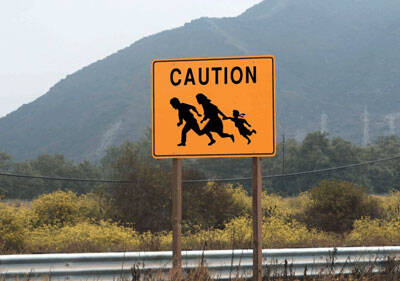Strangers do the strangest things. Suppose that’s how they got the name. If they did the expected, they wouldn’t be strange. Many folk fear strangers, perhaps because the unknown is often enough more frightening than the known. Whatever the reasons rolled out in discussing U.S immigration reform, even a cursory review of American history reveals an underlying, often unacknowledged, fear of the stranger.
Yet strangers need not evoke fear, indeed, their presence might do the very opposite, arouse hope. In his not-to-be-missed Our America: A Hispanic History of the United States, Notre Dame historian Felipe Fernández-Armesto accounts for the peaceful reception of Spanish explorers by many, though by no means all, American Indians by citing what he calls the “stranger effect,” which is:
the propensity some cultures have to receive the stranger with exceptional honor. In our modern Western societies, the propensity is hard to understand, since our attitude to strangers is like that of the peoples who resisted the Spaniards. We mistrust them. We reject them. We call them “illegals” We impose on them bureaucratic or fiscal burdens. If we admit them, we make them unwelcome and typically assign them low status and demeaning work. In other times, however, and in other parts of the world, people have not, in these respects, behaved like us. Sacred rules of hospitality oblige people in some cultures to greet strangers with their best gifts and goods and women and even actual deference. When Spaniards found themselves treated this way in parts of the Americas, they felt godlike—and with some reason: the anthropologist Mary W. Helms has collected many instances of cultures in which the values of visitors from afar increases with the distance they seem to have traveled, because they bring with them the aura of the divine horizon. This does not necessarily mean that people mistake them for gods, but it does explain why their persons are regarded as special, even sacred (13).
Standing so far removed from the stranger effect, contemporary Americans are equally estranged from the story of the Samaritan woman at the well. Implicit in the story is the blessing she received—living water—by welcoming her stranger. Though they had long lived side-by-side, Jews and Samaritans treated each other as aliens, yet Christ strode across several social barricades in speaking to this stranger: a woman who was not kin and not Jewish. According to Saint Paul, he did the same for us, dying for us while we were still estranged from God.
For Christ, while we were still helpless,
died at the appointed time for the ungodly.
Indeed, only with difficulty does one die for a just person,
though perhaps for a good person one might even find courage to die.
But God proves his love for us
in that while we were still sinners Christ died for us (Rom 5: 6-8).
It’s an ancient Christian theme, that Christ himself is encountered in the stranger. How strange then—and how sad—that we quickly forget it, when the stranger actually appears.
Exodus 17: 3-7 Romans 5: 1-2, 5-8 John 4: 5-42








